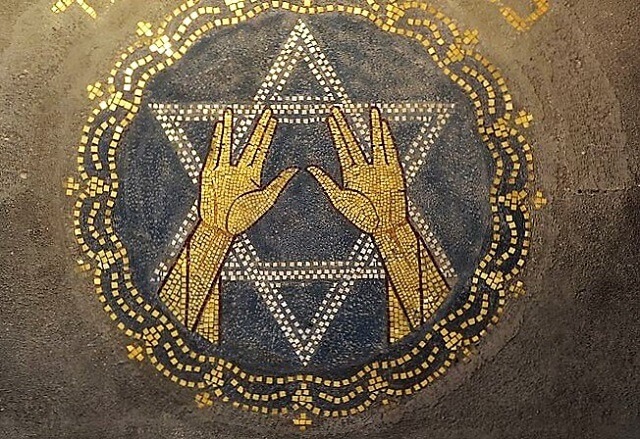
The Complaint of the Angels
The last blessing of Birkat Kohanim, the priestly benediction, is a request that God should be lenient when judging us:
” יִשָּׂא ה’ פָּנָיו אֵלֶיךָ — May God lift His countenance to you” (Num. 6:26).
“Lifting one’s face” is a Hebrew idiom for showing special consideration, especially by a judge. Is it fair that the Jewish people should be judged leniently, more than other nations?
In fact, the Talmud (Berachot 20b) relates that the angels raised this very question.
“The ministering angels asked the Holy One, ‘Master of the Universe, it is written in Your Torah (Deut. 10:17) that You do not show favor or take bribes. And yet, You show Israel special consideration, as it is written, ‘May God lift His countenance to you'!
God replied to them, ‘How can I not favor Israel? For I commanded them, ‘When you eat and are satisfied, you must bless the Lord, your God’ (Deut. 8:10), and they are punctilious [to say grace] over an olive-sized piece of bread [even though they are not satiated].”
What is the significance of this stringency that the Jewish people accepted upon themselves, to recite the grace after meals (Birkat Hamazon) even for a small piece of bread? Why should this earn them special treatment?
When is Leniency Appropriate?
While leniency sounds like a good thing, this is not necessarily the case. We are punished for wrongdoings, not out of Divine retribution or revenge, but in order to direct us to the proper path. Even if an individual is bursting with merits and good deeds, he will not gain from a reprieve, even for the slightest of errors. Without the appropriate measure of Divine justice, we do not learn to mend our ways and strive towards ever-greater perfection.
There is, however, a situation when the absence of Divine justice will not have an adverse effect. This case involves an individual who will continue to strive towards self-improvement even without the Divine wake-up call to introspection and moral accounting.
Such a person must have acquired the quality of hakarat ha-tov, sincere appreciation. When applied to God and His kindness, this trait is the height of morality. Our sense of gratitude is intensified when we feel that we are the recipient of undeserved kindness and compassion. And the only way we can return this favor is through spiritual and ethical growth, thus fulfilling God’s will.
The appreciative individual recognizes that God’s generosity is not commensurate to his actions. Not only will this Divine leniency not cause him to become lax in his conduct, but it will inspire him to work even harder to improve himself, since he has an additional reason to be appreciative of God’s ways.
Now we can understand God’s response to the angels. The explanation that the Jewish people deserve special consideration because they recite blessings even on olive-sized pieces of bread is not just some form of Divine tit-for-tat. Rather, their behavior is indicative of a refined appreciation of God’s kindness for their physical sustenance, even keener than that which the Torah requires.
The Appreciation Test
There is an additional factor at play here. When misdeeds go unpunished, two contradictory processes occur. On the one hand, undeserved leniency bolsters our feelings of gratitude. On the other hand, we may be ensnared by a sense that our actions are not accounted for — so why bother laboring over ethical improvement and spiritual growth?
Which feeling will prevail? An individual blessed with strong character traits will think: I am indebted to God’s compassion; therefore, I must redouble my efforts to improve. A weaker person, on the other hand, will be misled by the mistaken sense that God does not fully monitor our actions.
How can we determine which way of thinking will triumph? Here is a simple test. If a person recognizes God’s kindness even when all of his needs have not been met, this is a sure sign that he is blessed with a robust trait of appreciation. Such a person has a correct understanding of God’s relationship to His creations, and recognizes that God does everything for the good. In this case, we can be assured that, in a conflict between these two feelings — appreciation for God’s leniency, and a deluded impression of limited Divine providence — the true feeling of appreciation will prevail.
Thus, one feels the need to express gratitude for even a small measure — even an olive-sized piece of bread — despite the fact that he is still hungry and his needs have not been fully met; it is clear that his natural sense of appreciation is strong and healthy. The Jewish people, who recite Birkat Hamazon even when they are not satiated, demonstrate their innate mindset of hakarat ha-tov, and will always interpret God’s leniency and special consideration in the correct way.
(Gold from the Land of Israel. Adapted from Ein Eyah vol. I, pp. 102-103.)
Illustration image: Mozaic in synagogue in Enschede





